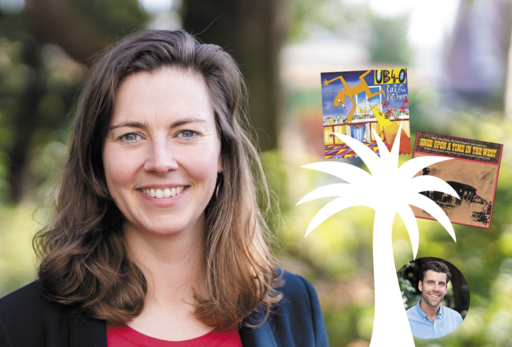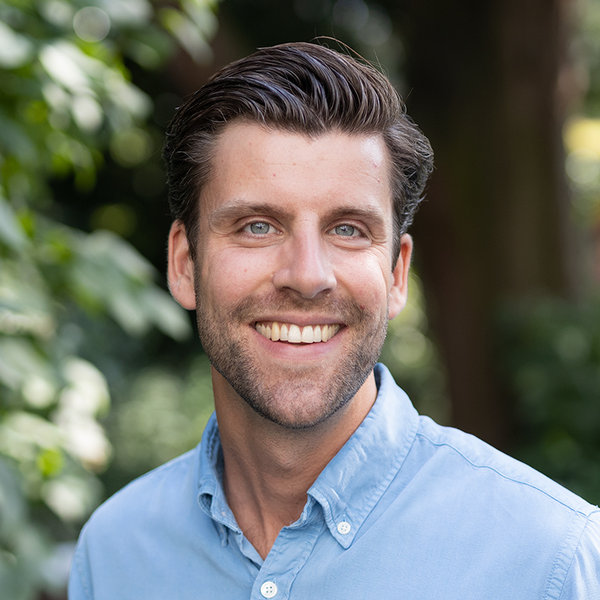
Cette page n'est pas disponible en français
Choisissez langues
Anglais,
Néerlandais
It's one of those Monday mornings. With her husband and two kids (aged four and five) to the dentist. Running late, of course. Jumping in the car to be on time for an interview. It happened to our new colleague Suzanne van Duin. Once properly installed, on this sunny spring day, a conversation unfolded about UB40, Ennio Morricone, Once Upon a Time in the West, about growing up abroad and how that helps in life. And we talk about the new chapter Suzanne is starting in her working life, at Kessels & Smit, The Learning Company. We would like to introduce her to you. Personally and professionally.
"Everything has a sound and melody".
What is your first album/LP/CD?
Recently my husband gave me a 'new old' record player, for my office. I really love music, even though I do not have an 'average taste'. Until I was eight years old, I grew up in various places abroad. Varying from Bangladesh to South Korea. In those places, we had limited access to music and television. My favourite music was Ennio Morricone (think Westerns like Once Upon a Time in the West and The Good, the Bad and the Ugly) and UB40. So now I have LPs of this music!
What a beautiful and special combination! What do these musical styles say about you?
"The great thing about Morricone is that he worked with the leitmotiv. That means that he, as a composer, gives a character his/her own melody, which constantly returns in the film music. That is what I like about it. Take Once Upon a Time in the West. In this movie, protagonist Jill falls in love with a widower who lives with his family on a ranch. Whenever Jill comes on screen, you hear her melody representing her gentle and caring character, and her curiosity and courage to stand up in the roughness of the Wild West. All the events that she and other characters go through are given sound in the music and with it their own recognisable storyline. This is also how I look at things that I experience in my life and what I see others experience in theirs. Everything has a place in a story. Everything has its own sound and melody. And this should be heard, without judgement. Every voice has a place in the story.
And secondly, sometimes I need UB40. When I am a bit too serious. Then I need something light-hearted. Take the song Rat in the Kitchen. Hilarious song! Sometimes things happen in life that annoy us and we have to deal with that, like a rat in the kitchen... Humour, simplicity and laughter for me are helpful in these situations.
"These experiences have made me realise that your world is not necessarily the other person's world."
You already mentioned something about growing up abroad. Can you tell us more about that?
My father worked as an engineer at DHV. That's why I grew up in different countries until I was eight. From South Korea to Bangladesh and Mozambique. These experiences have made me realise that my world is not necessarily the same as someone else’s. I learned to be careful with assumptions and that there is so much to discover behind what someone says or shows at first sight.
What was it like for you to come to the Netherlands at eight?
It was quite a change being in the schoolyard in the Netherlands. So many children. So many different groups. I did not know where to start. There were children who did not like each other and bullied each other, or groups that stuck together and were inseparable. Also using swear words was unfamiliar for me, I had no idea what they meant. That was a kind of invisible culture shock as an eight-year-old. I did see enormous opportunities to play with everyone. In the beginning, it took some time to discover how to deal with all those kids. I was a bit shy. I had to grow into that. Later, I became a kind of everybody's friend. I had a regular group I belonged to, but I could also move between groups very well. I enjoyed that very much.
"Sing your own Song."
You are now starting a new chapter in your career at Kessels & Smit, The Learning Company. That makes me curious which chapter you're stepping out of...
The Good, The Bad and The Ugly, I guess. With the subtitle: What do you do about it? This movie is about three characters who are forced to work together to find gold. If you work in an organisation, you depend on each other, you experience nice and less pleasant things together, you have to work together towards a common goal. This provides opportunities, but can also be difficult. I have worked as an HR Manager in large international companies (AkzoNobel, Eneco, Upfield) for twelve years. When you work in an organisation, you have to relate to all kinds of things, and find your way. That is not a problem, it is part of the job and a lot of fun. I have often seen the good and lesser sides of an organization. For me it was important to find out how I could help to build on that from my role internally, in HR at the time; to create different insights from within, to help the organisation with a change issue or learning process, or simply to 'clean up the mess' that was there. Experiencing this, within an organisation, is very different from working as an external consultant. This phase of 'being in it', I leave behind. But I do take the richness of this experience with me in my new role as an advisor at Kessels & Smit, The Learning Company.
And what is the title of your new chapter?
Sing your own Song! (also by UB40, by the way). I am now experiencing a great opportunity and discovery in how I can use myself as a consultant and change agent, so that I can help others progress in their work and personal development. I know how it is to deal with pressure, politics, changes, dependencies and different interests within a company. I use that to ask all sorts of questions about the organisations I work for.
I am especially curious about what keeps the organisation busy and the context of the group I am going to work with. What is happening to them? What do they have to relate to? What is effective? Where lies the strength, energy and inspiration in a team? And what are the worries, obstacles and triggers? After discovering the answers to these questions with the people involved, I have a very clear focus on 'if we understand the context sufficiently, what are we going to do now?'. Something really has to happen. I then help translate insights into action(s).
What does that say about what you like to work on?
I like to work on change and transformation challenges. They affect all layers of an organisation. If something changes, you have to do something with it. It is important to have direction and vision on where you want to go. Using the individual perspectives, you come to a conclusion as a team about what you have to do with regards to the change. I like to build on that from a developmental perspective, and seizing the opportunities to take steps in the right direction.
Also, I like to work on awareness, insight into team dynamics, and practical exercises. Recently, I supervised a group of people who practised different influencing styles with an actor. I love fascilitatinig these learning environments. I can really feel how the participants deal with nerves, searching for new words and curiosity. I help them turn insights into skills they can use in their work every day. To give them a helping hand and the confidence that they will succeed. And then they do succeed! Afterwards, participants leave the exercise feeling happy and richer. I see that as a real contribution to a positive learning experience, so that they can achieve their goals even more effectively in their work.
Why is that important to you?
For me it is about perspective, perseverance and practical advice. In my experience some people I worked with were limited by unproductive beliefs and thoughts. Or when they wanted to solve an obstacle, they had difficulty seeing 'how to'. The key is to broaden your perspective and turn this new insight into action. By letting others see possibilities and, together with them, discover what they really want to do. When that energy is felt (again), so much is possible, then the road to 'how to' suddenly becomes much easier. And if you then start working towards your (new) goal, for me it is also about perseverance. Go for it and hold on to your goal! Changing something doesn't happen by itself, so be realistic and know that there will be bumps that you can handle. When you see what people can do (sometimes without them believing it at first)... that is phenomenal! That makes me happy.
What is an important 'lesson' you learned?
What I learned in organizations is, for example, to estimate the size of a problem properly. I had to learn this both myself and with others in the companies I worked for. I remember someone who undermined the authority of his team leader. The team leader was so angry. I was lucky in HR that I was not involved, and good take the role of advisor. It helps to listen carefully and to take everyone seriously and to see what the issue is really about. I often worked with hypotheses, like 'I have the impression that the reaction is exaggerated, but I am going to investigate that first'. When someone is very emotional, they are sometimes less able to think clear and reflect on their next steps. So it helps to first acknowledge their emotion(s), and then look at what problem remains and widen their perspective. We then translate their new way of looking at the issue to next steps and actions that are helpful in the long run.
Finally: if I speak to you again in a year's time, what is the best project/movement/question that you look back on?
I would like to work for an organisation where they are facing a change and challenges with regards to business transformation. I would like to help them deal with it on various levels, so that they can give their own answer and make a success of it. I want employees to become aware of their talents, strengths and potential in such a way that they can effectively contribute to the organisation's challenge. We are going to ensure that employees are involved and share their creative ideas, or to experiment and explore what will help them towards their goals. In the metaphor of music: If you always hit the same notes, you hear the same thiinhgs you did before. Sometimes a change requires the same notes in a different composition, or perhaps it requires you to expand your sound register. That is a discovery and a learning process. It is not only about skills or behaviour, but also about the courage to take a look at the situation differently. We go through that process together. I would love to contribute to that process and result, a new melody in the organization.
